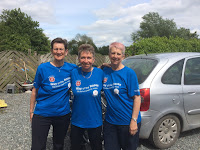A post from the Palace (or Gills Hog blog number 1).
In September 2017 I decided to open a hedgehog rescue centre in response to local need. This was not on a whim and I am not a mad hedgehog lady. I have been rescuing various animals for most of my life. As a child our house was rather like the Durrells with all manner of creatures walking, flying, trotting and swimming around it. I can remember as a small child having a full funeral ceremony for a dead hedgehog, insisting my parents sang hymns as we buried it. My Dad even had to return a live lobster (given for tea as a rare treat )to the ocean in order to stop my sister crying! I have never had a moment that wasn't shared with some beautiful creature and animals are an extremely important part of my being. I currently live on a smallholding just outside Howden, East Yorkshire with many furry and feathered friends (around 60 in number). I also have a medical background and so wounds, maggots, and faeces cause me no concern. A hedgehog sanctuary seemed a way of formalising and hopefully funding a worthwhile venture.
My (long suffering) husband set about creating a suitable centre in an outbuilding and 'Pricklington Palace' was born with the help of many wonderful donations from friends and family, and the essential support of my local veterinary practice.
I decided that six 'beds' would be enough with all my other commitments. That has grown to 13 now and since that first day some 80 hogs have passed through its doors. I have recruited a few wonderful foster carers who take well hogs for TLC when their treatments have finished. I have an intensive care incubator and research microscope which I have been able to purchase via crowdfunding and donations and which are absolute life savers. It is though a 365 days a year commitment, in all weathers and no matter how I am feeling, and I am running it purely voluntarily with only voluntary contributions to rely on.
My aim is to admit, treat and release as quickly as possible, but of course I now have a hogspital full of those who were just too small to release before the winter cut off. My current 9 guests are enjoying 5* accommodation in heated hutches and a varied menu until the eagerly anticipated spring release. I have identified and treated all manner of intestinal worms, ringworm and mange, strimmer injuries and amputations and have painstakingly removed thousands of maggots and countless ticks. I have syringe fed, injected, coaxed and coerced in order to get the necessary treatment onboard a needy hog. I am a member of a wonderful online group of rescuers who share knowledge, experience and advice and commiserate and congratulate in equal measure.
Hedgehogs are up against so much and whilst they are endangered they are not a protected species. The greatest threat is probably the huge reduction in invertebrate numbers and whilst they prefer beetles and caterpillars as food they have had to turn more and more to those creatures who host all number of parasites which can prove deadly to hedgehogs. Lack of suitable food, pesticides and slug pellets, the increase in road traffic, domestic dog attacks and various other threats have led to a state of emergency for our prickly friends and we are at a very real risk of losing them forever if we do not act to preserve their habitat and allow them the opportunity to thrive.
Hedgehogs are very cute...
....but they are wild animals and do not enjoy human contact or intervention and so I keep my contact to a minimum and disturb them only when necessary. They are very fussy eaters and each has a preferred diet which I learn by a process of (sometimes wasteful) elimination. I haven't been able to save them all, but even those that have died have done so in a warm and comfortable environment, free from predators or pain. It is a though wonderful feeling to take something very sick and fragile and treat it successfully and release it back to the wild.
My top 5 tips to others would be...
- If you find a hedgehog out it daylight it needs help (unless it is a nursing Mum who will be looking well and moving with purpose).
- Keep the hog warm and offer a small amount of food and fresh water. Make sure it has a towel or something to bury in which will reduce stress enormously.
- Take any sick hedgehog to a vet or rescue centre for a health assessment. They can look well but be harbouring potentially deadly parasites that need to be treated as soon as possible.
- Make a simple hedgehog feeding station and feed them with meaty cat/dog food or dry biscuits and fresh water (never milk or bread which will kill them) https://thehedgehog.co.uk/feeding-hedgehogs/how-to-stop-cats-dogs-and-foxes-stealing-the-hedgehogs-food/
- Ensure that they can enter and exit your garden (and garden ponds) with ease.
If you would like to support my work, sponsor a hog or donate an item please visit and join my page on Facebook at https://www.facebook.com/pricklingtonpalace/
You can donate via PayPal at https://www.paypal.me/Dixon1829 or can buy an item from my Amazon wish list.


















